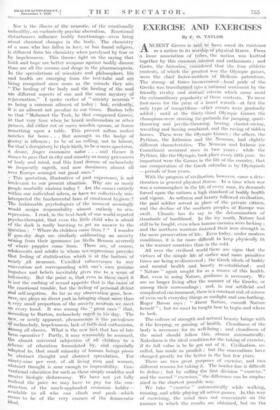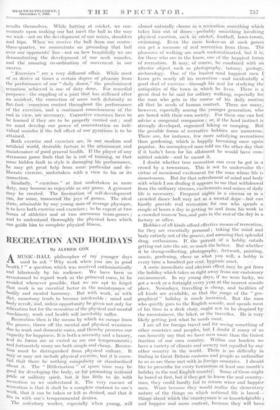EXERCISE AND EXERCISES
By F. 0. TAYLOR
A NCIENT Greece is said to have owed its existence as a nation to its worship of physical fitness. From a loose association of tribes, the nation was knitted itogether by this common interest and enthusiasm ; and Grote, the historian, considered that the four athletic contests, of which the greatest was the Olympic games, were the chief foster-mothers of Hellenic patriotism. The strong—at times inconvenient—local pride of the Greeks was tranSfOrtqedinto a national sentiment by the friendly rivalry and 'Mutual, esteem which arose amid the extraordinary popularity of these contests. To mere foot-races for the prize of a laurel wreath-7-a first the only type: of Competition--Other events Were -gradually added ; until at the thirty-third Olympic Games the champions:1\We striving for-garlands_for jumping, quoit- throwing and javelin-throwing, boxing, chariot-racing, wrestling and boxing combined, and the racing of ridden horses. These were the Olympic Games ; the others, the Pythian,. the Isthinian and the Nernean,. had slightly different characteristics. The Nemeari and Isthmic (or Corinthian) occurred' Once in two years ; while the Pythian, like the Olympic, took place every fifth year. So important were the Games in the life of the country, that . one Computation of the Greek calendar is by Olympiads —periods of four Years.
With the progress of civilisation, however, came a dete- rioration, in general physical fitness. In a time when war was a_ commonplace in the life, of every man, its demands forced upon the nations a high standard of bodily health and vigour. As softness and luxury followed civilisation, the paid soldier served in place of the private citizen, and the decline of the southern peoples of Europe was swift. Climate has its say in the determination of 'standards of hardihood. In the icy north, Nature had still to be fought, even when human enemies were lacking and the northern warriors fostered their iron strength in the mere preservation of life. Even today, under modern conditions, it is far more difficult to keep physically lit in the warmer countries than in the cold.
All over the civilised world there are signs that the virtues of the simple .life of earlier and more primitive times are being re-discovered ; the Greek ideals of bodily and mental health and beauty re-established ; and " Nature " again sought for as a 'source of 'this health. But, even in using Nature, guidance is necessary. We are no longer living after the manner of the Greeks, or among their surroundings ; and, in our artificial and complicated environment, there is a constant risk of misuse of even such everyday things as sunlight and sun-bathing. Roger Bacon says : " About Nature, consult Nature herself " .; but ive'rimst be taught how to begin and where to look.
The culture of strength and.natural beauty brings with it the keeping, or gaining, of health. Cleanliness of the body is necessary for its well-being ; and cleanliness of the mind should follow this, almost automatically. Nakedness is the ideal condition for the taking of exercise, if its 'full value is to be got out of it. Civilisation, so- called, has made its prudish ; but the conventions have changed greatly for the better in the last few years. There are two great purposes of exercise, and two different reasons for taking it. The border-line is difficult to define ; but by calling the first division. " exercise," and the second " exercises," the difference can be ernpha, Isised in the shortest possible Way. We take exercise " automatically while walking, running, and while playing :id' actiVe. games. Inthis way of exercising, the mind does not concentrate on the manner in which the results are obtained, but on the results themselves. While batting at cricket, we con- centrate upon making our bat Meet the ball in the way we wish—not on. the development of our wrists, shoulders and hips. When' We receive the ball from our centre- three-quarter, we concentrate on grounding that ball over our opponents' line—not on how beautifiilly we are demonstrating the development of our neck muscles, and the amazing .co.-ordination . of movement , in our swerve.
" Exercises " are a very different affair. While most of us derive at times a certain degree of pleasure from the performance of our " daily, dozen," the predominant sensation achieved is one of duty done. For, remedial purposes---the suppling of a joint that has stiffened after an aceident, the correction of some such deformity. as flat-foot—conscious control throughout the performance of the exercises, and a continued consciousness of the cud in view, are necessary. Corrective exercises have to be learned if they are to be properly carried 'out ; and We must ,develop. our power of o , concentration on indi- vidual mnscles if the full' effect of our gyrations is to be attained.'
Both exercise and exercises are, in our modern and artificial .WOrld, desirable factors in', the attainment and maintenance of good general health. If the player of any strenuous game finds that he is lout of training, or that some hidden fault in style is damaging his performance, he may get great help from some particular and de- liberate exercise, undertaken with a view to his or its correction.
Similarly, " exercises " at first undertaken as mere duty, may become as enjoyable as any game. A gymnast may be created. The fascination of self-development can, for some, transcend the joys of games. The ideal state, attainable by any young man of average physique, is to love both exercise and exercises ; to be expert at two forms of athletics and at two strenuous team-games ; and to understand thoroughly the physical laws which can guide him to complete physical fitness.



























































 Previous page
Previous page